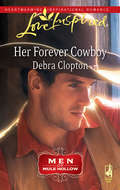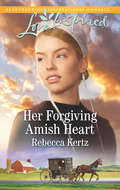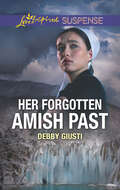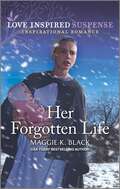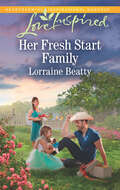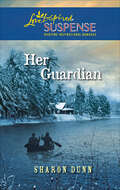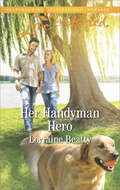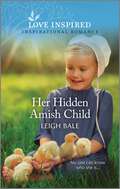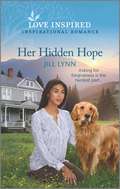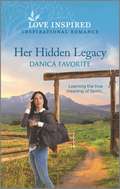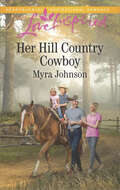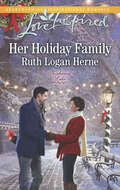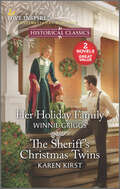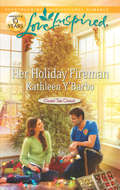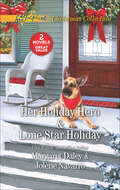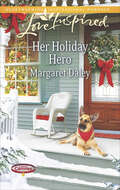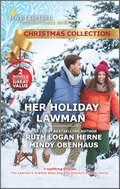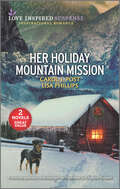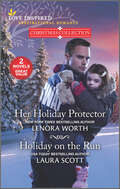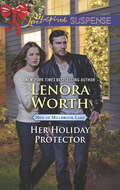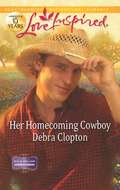- Table View
- List View
Her Forever Cowboy
by Debra CloptonMule Hollow, Texas, is chock-full of handsome cowboys ready to say "I do." So veterinarian Susan Worth moves in, dreaming of meeting Mr. Right. He's most certainly not the gorgeous rescue worker blazing through town on a motorcycle. Cole Turner is a sixth-generation Mule Hollow rancher, but he's all about roaming Texas to save everyone but himself. The hurt hidden deep inside his heart keeps him from settling down. But Susan is determined--and knows just how--to make him her forever cowboy.
Her Forgiving Amish Heart: Her Forgiving Amish Heart His Surprise Son The Firefighter's Twins (Women of Lancaster County)
by Rebecca KertzCan she forgive and forget—and fall in love?A Women of Lancaster County StoryLeah Stoltzfus hasn’t forgiven Henry Yoder for betraying her family years earlier. But Henry is a changed man. And wants to prove it to Leah. Then a family secret is unearthed, shaking Leah to her core. Henry’s determined to support her in every way. If only she could leave the past behind and open her heart to him…
Her Forgotten Amish Past (Love Insp Susp True Lp Trade Ser.)
by Debby GiustiA woman on the run with amnesia seeks shelter with an Amish man and his family, in this inspirational romantic suspense from a USA Today–bestselling author.Someone wants Becca Troyer dead, but who or why is a mystery to her. Seeking refuge at the home of Amish farmer Zeke Hochstetler is her only hope to stay one step ahead of the killer. With every clue she finds about her past leading to more confusion, Becca and Zeke must untangle the truth before her pursuer discovers where she’s been hiding.
Her Forgotten Cowboy: A Fresh-Start Family Romance (Cowboy Country #10)
by Deb KastnerShe can’t remember the pastHe can’t imagine a future without her in Cowboy CountrySuffering amnesia after a car accident, Rebecca Hamilton arrives back in Serendipity, Texas, pregnant and seeking the baby’s father—her estranged husband, Tanner. Returning to the ranch house they once shared is her best chance at regaining her memories. But will recalling the tragic reason they separated only drive a bigger wedge between Rebecca and the man she’s falling for all over again?
Her Forgotten Life
by Maggie K. BlackFrom USA TODAY bestselling author Maggie K. Black… To protect her baby she needs to remember who she is. Gunshot victim Sara Kilpatrick has no memory of her life before she ended up in an Amish farmhouse—or why someone&’s trying to kill her. But when clues lead to her own gravestone, Sara discovers a deadly conspiracy—and a husband and baby she doesn&’t remember. And uncovering the truth could cost her everything…including the family she just found.From Love Inspired Suspense: Courage. Danger. Faith.
Her Fresh Start Family: The Amish Suitor Reunited With The Bull Rider Her Fresh Start Family (Mississippi Hearts #1)
by Lorraine BeattyA young widow finds a new life and a new love in a little Mississippi town—but will a secret bring it all crashing down?Struggling with a tragic loss, widow Nina Johnson seeks a fresh start in a small Southern town. Then she meets handsome veteran Bret Sinclair and his sweet daughters. Bret’s no stranger to loss, and his companionship is the solace Nina’s been searching for.Until a dark secret from Bret’s past is exposed, threatening to break two hearts . . .
Her Guardian
by Sharon DunnA woman shares a safe house with a handsome bodyguard while awaiting the trial of her childhood abductor in this inspirational romance.Julia Randel was thirteen when she was kidnapped by a cult leader. It took her seven years to escape. Two years later her captor’s trial is about to begin—and so are threats from his loyal followers. Julia is relieved when her father hires bodyguard Gavin Shane, but she’s furious when he rushes her to a safe house. After years under lock and key, she doesn’t want to be forced into hiding again. But with cultists seeking to stop Julia’s testimony at any cost, it’ll take both Julia and her determined protector to set her free for a new life—and new love.
Her Handyman Hero: An Amish Arrangement Claiming Her Cowboy Her Handyman Hero (Home to Dover)
by Lorraine BeattyAn ex-DEA agent masquerades as a handyman for a chance to keep his family together in this heartwarming inspirational romance.Reid Blackthorn arrives in Dover on a personal mission—to make sure his terminally ill brother gets a chance to meet his daughter. Deceiving little Lily’s guardian isn’t his intention. Yet once Tori Montgomery mistakes Reid for her new handyman, he knows it’s the only way to be close to his niece.Tori is honoring her friend’s last wish by keeping Lily away from her father’s family. And once she learns who Reid truly is, she realizes there’s too much at stake—including custody of Lily—for her to fall for the former DEA agent. But in keeping a promise, is she losing out on her chance for a happily-ever-after?
Her Hidden Amish Child: An Uplifting Inspirational Romance (Secret Amish Babies #4)
by Leigh BaleCan a little girl… Heal the wounds of the past? When Faith Mast inherits her great aunt&’s Amish farmhouse, she needs to sell it fast—before someone in the community discovers her daughter&’s real identity. Accepting Josiah Brenneman&’s help with repairs is risky but might be the perfect solution. That is, until the man she once loved and left wins the little girl&’s heart. With secrets still between them, will Faith choose the future she&’s always wanted…or repeat the past?From Love Inspired: Uplifting stories of faith, forgiveness and hope.Secret Amish Babies Book 1: The Midwife's Christmas WishBook 2: Her Forbidden Amish ChildBook 3: An Amish Christmas WishBook 4: Her Hidden Amish Child
Her Hidden Hope: Colorado Grooms (Colorado Grooms #4)
by Jill LynnEnjoy this heartfelt romance from Jill Lynn, part of the sweet and emotional series Colorado Grooms.She once trusted him with her heart… but will she ever trust him with the truth?With only two weeks to renovate her family’s Colorado B and B, struggling single mom Addie Ricci can’t turn away help. Especially not when it’s her handsome high school sweetheart, Evan Hawke, who’s offering to pitch in. As they repair the B and B, Addie and Evan also begin rebuilding their relationship…until a secret from their past threatens to bring it all crashing down. From Love Inspired: Uplifting stories of faith, forgiveness, and hope.Colorado Grooms:Book 1: The Rancher’s Surprise DaughterBook 2: The Rancher’s Unexpected BabyBook 3: The Bull Rider’s Secret Book 4: Her Hidden Hope Book 5: Raising Honor
Her Hidden Legacy (Double R Legacy #4)
by Danica FavoriteShe thought she knew what she wanted… until she met him. To save her magazine, RaeLynn McCoy must write a story about the Double R Ranch—and face her estranged family. But when ranch foreman Hunter Hawkins needs help caring for the children temporarily in his custody, it becomes impossible to do her job and leave without forming attachments. After raising her siblings, RaeLynn enjoys her career-focused life, but with Hunter, she&’s starting to dream of family… A DOUBLE R LEGACY ROMANCEFrom Love Inspired: Uplifting stories of faith, forgiveness and hope.Double R LegacyBook 1: The Cowboy's SacrificeBook 2: His True PurposeBook 3: A True CowboyBook 4: Her Hidden Legacy
Her Hill Country Cowboy (Large Type (dtc) Li Trade Ser.)
by Myra JohnsonA single father clashes with a former social worker, before realizing she’s just what his family—and his heart—needs. From the award-winning author.Single father Seth Austin will do anything for his children. So when he discovers the new housekeeper his grandmother hired for their guest ranch is a former social worker, he plans to keep his family far away from Christina Hunter. Seth once almost lost custody of his beloved kids because of an overzealous social worker. Problem is his children adore Christina and her sweet service dog—and he’s starting to fall for her, too. Recuperating from an accident, Christina is determined to slowly ease back into her old life. But the more time she spends with them, the more she realizes that her future might be with the cowboy and his family.
Her Holiday Family
by Winnie GriggsTHE CHRISTMAS CHILDREN Reserved widow Eileen Pierce never considered herself the kind of woman who was cut out to be a mother. She wouldn't know what to do with one child, much less ten. But when handyman Simon Tucker is stranded in town with a group of young orphans at Christmastime, she discovers she can't just turn them away. Simon knows there's more to Eileen than meets the eye. Though his easygoing demeanor immediately clashes with her buttoned-up propriety, Simon's kindness soon melts Eileen's stern facade. Simon and the children already upended Eileen's quiet, orderly life. Will they do the same to her guarded heart? Texas Grooms: In search of their brides...
Her Holiday Family (Kirkwood Lake #5)
by Ruth Logan HerneA soldier returns to his hometown and finds love, faith and forgiveness in this inspirational romance from a USA Today–bestselling author.Home for the HolidaysWhen her café goes up in smoke, Tina Martinelli decides to make a big change. She plans to leave Kirkwood Lake and start over—somewhere without the haunting memories of family and failure. But just as she’s plotting her new life, her girlhood crush Max Campbell returns to town—and suddenly takes notice of Tina all grown up. Having retired from his military career, Max’s ready to start over, too. He’s given his heart to her. Now, if only Max can convince Tina to stick around this Christmas—and forever after.Kirkwood Lake: A town full of heart and hope
Her Holiday Family and The Sheriff's Christmas Twins
by Winnie Griggs Karen KirstSurprise Christmas blessingsHer Holiday Family by Winnie Griggs Reserved widow Eileen Pierce never considered herself cut out to be a mother. But when handyman Simon Tucker is stranded in town with ten young orphans at Christmastime, she can't just turn them away. Though Simon&’s easygoing demeanor clashes with Eileen&’s buttoned-up propriety, his kindness melts her stern facade. Soon Simon and the children upend Eileen's quiet, orderly life. Will they do the same to her guarded heart?The Sheriff's Christmas Twins by Karen Kirst Convinced that Allison Ashworth deserves better, Sheriff Shane Timmons has always tried to remain aloof. But with Allison in Gatlinburg for the holidays and caring for two motherless babies, Shane wants to help her. Allison has always been drawn to Shane, but he never seemed to look her way. Now, spending time with him and the twins gives her hope that her dreams of motherhood—and a life with Shane—may come true.
Her Holiday Fireman
by Kathleen Y'BarboFrom his first encounter with the feisty redhead, widower and fire marshal Ryan Owen knows he's in trouble. He's in Vine Beach to heal, not to find romance. As for Leah Berry, she's come home strictly to lay claim to her family's restaurant and fend off developers. Leah is infuriated when Ryan shuts down the restaurant on violations. Both are determined to have their way, even as something unexpected starts blossoming between them. They'll need to learn the hardest thing about love and faith-letting go.
Her Holiday Hero & Lone Star Holiday: Her Holiday Hero Lone Star Holiday
by Margaret Daley Jolene NavarroCelebrate Christmas with a lovable dog, sweet kids . . . and two heart-touching romance novels in one delightful volume!Her Holiday Hero by USA Today–bestselling author Margaret DaleyCaptain Jake Tanner is struggling to find Christmas cheer. Having survived a devastating attack overseas, he has emotional scars that run deep. Widow Emma Langford wants to show Jake that a four-legged companion is the best therapy, but she’s afraid that the closer she gets, the more her own wounds will be revealed . . . Lone Star Holiday by Jolene NavarroLorrie Ann Ortega will never be the kind of woman who would make a good wife for handsome widowed pastor John Levi. But when she agrees to be nanny to his two sweet daughters, she can’t keep herself from dreaming that a man like John could one day love her. Can a prodigal daughter turn into a pastor’s wife for Christmas?
Her Holiday Hero: Her Holiday Hero Lone Star Holiday (Caring Canines #2)
by Margaret DaleyA service dog gives a soldier the courage to love in this heartwarming romance from the USA Today–bestselling author of Healing Hearts.The holidays are right around the corner, but Captain Jake Tanner is struggling to find Christmas cheer. Having survived a devastating attack overseas, he has emotional scars that run deep. When Jake meets beautiful widow Emma Langford, his heart is unprepared for the feelings she inspires.Training service dogs has taught Emma to recognize those in need. She wants to show Jake that a four-legged companion is the best therapy, but she’s afraid that the closer she gets, the more her own wounds are revealed.Together, Jake and Emma will discover it takes a different kind of bravery to open themselves to love—and to healing.Caring Canines: Loving and loyal, these dogs mend hearts.
Her Holiday Lawman
by Ruth Logan Herne Mindy ObenhausDreaming of a perfect ChristmasThe Lawman's Yuletide Baby by Ruth Logan Herne Widow Corinne Gallagher&’s plans for a peaceful Christmas with her kids go astray when longtime crush Gabe Cutler moves in next door. As if having the handsome state trooper within snowball-throwing distance isn&’t distracting enough, Gabe suddenly has custody of an orphaned baby and is in need of Corinne&’s help! She agrees, but her heart draws a line—she can&’t fall for another lawman!The Deputy's Holiday Family by Mindy Obenhaus Lacie Collier wants to give her niece, Kenzie, the best Christmas! But that won&’t be easy while spending the holidays with Lacie&’s Christmas-averse mother. Sheriff&’s deputy Matt Stephens is surprised to see Lacie back in Ouray. He&’s always regretted that their friendship became strained after he started dating her sister in high school. But he's more than shocked when he sees Kenzie, whose resemblance to Matt is undeniable…USA TODAY Bestselling Author Ruth Logan Herne2 Uplifting Stories The Lawman's Yuletide Baby and The Deputy's Holiday Family
Her Holiday Mountain Mission
by Carol J. Post Lisa PhillipsTwo inspirational romantic suspense holiday stories featuring men and women who put their lives on the line to protect the innocent. Bodyguard for Christmas by Carol J. PostWhen his young son is nearly kidnapped, assistant district attorney Colton Gale needs a Christmas refuge—and a live-in bodyguard. Though former military police officer Jasmine McNeal fights to shield them 24/7, she refuses to get attached. But growing close to the little boy and his father might be her only shot at keeping them alive—and becoming a family beyond the holidays.Yuletide Suspect by Lisa PhillipsNothing will stop Secret Service agent Liberty Westmark from warning her ex-fiancé, Tate Almers, that he’s wanted on a terrorism charge—not even gunmen determined to kill them both. With a mountain of evidence against him and both the feds and a rogue cartel after him, Tate needs Liberty’s help. Now they’ve become the targets of a manhunt with just one ending . . . and they have only each other to stay alive.
Her Holiday Protector and Holiday on the Run
by Lenora Worth Laura ScottA holiday in hidingHer Holiday Protector by Lenora WorthWhen a killer comes after Rikki Allen, detective Blain Kent learns she’s the daughter of Franco Alvanetti, the notorious crime kingpin. A by-the-book former marine, Blain has made it his life mission to put the Alvanetti family out of business. Yet he has to trust Rikki to protect her from a killer who wants her dead by Christmas.Holiday on the Run by Laura ScottAfter witnessing a murder, Melissa Harris faked her death and went into hiding. For years, it worked—until now. When bullets begin to fly, SWAT cop—and Melissa’s former high school sweetheart—Nate Freemont rescues Melissa and her little girl. Now with Christmas approaching, can Melissa risk everything to reveal the truth and accept a second chance with Nate…as deadly enemies close in?New York Times Bestselling Author Lenora WorthUSA TODAY Bestselling Author Laura Scott
Her Holiday Protector: Her Holiday Protector Christmas Undercover The Marshal's Runaway Witness (Men of Millbrook Lake #2)
by Lenora WorthA smalltown Florida detective must put his faith in a woman with a shadowy past in this uplifting holiday romantic thriller.After witnessing a murder in her own home, Rikki Allen goes running for help. But when she finds detective Blain Kent, she isn’t sure how much she wants to reveal about herself. Blain suspects that Rikki may have been the intended target. And he wonders why this vulnerable beauty is being so cagey. When the killer comes after Rikki at a safe location, Blain finally gets the truth: Rikki is the daughter of notorious crime boss Franco Alvanetti. A by-the-book former marine, Blain has made it his life mission to put the Alvanetti family out of business. Yet he has to trust Rikki to protect her from a killer who wants her dead by Christmas.
Her Holiday Secret (Cowboys of Diamondback Ranch #6)
by Jolene NavarroShe&’s home for the holidays… with a daughter he didn&’t know existed. Six years ago, pregnant teenager Catalina Wimberly left town without a word to protect her childhood sweetheart Andres Sanchez&’s future. Now she&’s back for the holidays and ready to reveal her secret—she and Andres have a little girl. But as they begin to feel a lot like family, will Catalina turn down her dream job and stay beyond Christmas?From Love Inspired: Uplifting stories of faith, forgiveness and hope.Cowboys of Diamondback Ranch Book 1: The Texan's Secret DaughterBook 2: The Texan's Surprise ReturnBook 3: The Texan's PromiseBook 4: The Texan's Unexpected HolidayBook 5: The Texan's TruthBook 6: Her Holiday Secret
Her Home or Her Heart
by Kasandra ElaineChristian romance set mostly on a cruise ship on the Mississippi River.
Her Homecoming Cowboy
by Debra CloptonAfter losing his mother, Annie Ridgeway's sweet six-year-old nephew thinks he's an orphan. Turns out the father he never knew is bull rider Colt Holden-the boy's hero. Before bringing them together as father and son, Annie has to make sure Colt is as good a man as he is a cowboy. When she arrives in Mule Hollow, she finds the handsome, honorable man guarding his burdened heart against caring for anyone or anything. Will a little boy's devotion be the fighting chance they all need?
